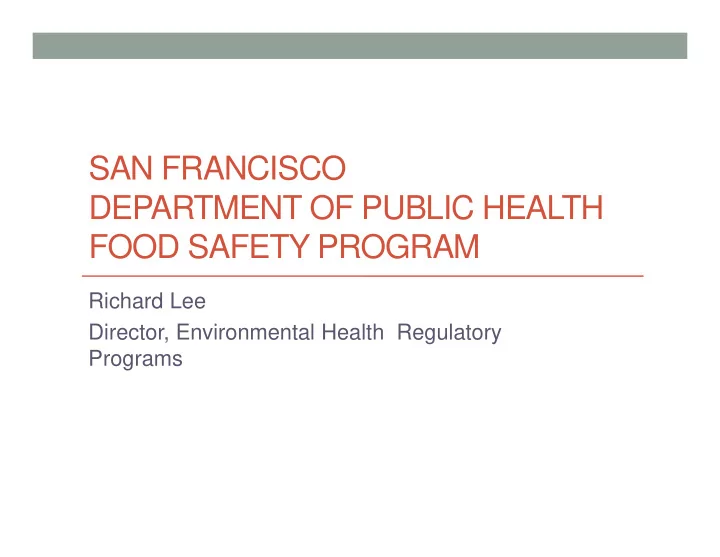

SAN FRANCISCO DEPARTMENT OF PUBLIC HEALTH FOOD SAFETY PROGRAM Richard Lee Director, Environmental Health Regulatory Programs
Program Mission • Prevention of food borne illness in retail food facilities • Annually, 48 million FBI cases, 128,000 hospitalized and 3000 deaths in the US • Primary pathogens include Salmonella sp., Bacillus cereus, Vibrio sp, norovirus, and hepatitis A • Safe food handling and training of food handlers can prevent FBIs
Retail Food Program Overview • Thirty-four employees • Diverse workforce and leadership • Annual budget of ~$7 million; ~99% funded by license fees • Conducts 21,500 inspections annually in over 7000 regulated food facilities • Standardized safety criteria and inspection protocols • Investments in education and training of food industry
Management of Safety Hazards: Example I Violations observed • Unsafe food handling • Lack of food safety knowledge • Equipment disrepair • Rat and cockroach infestation • Sewage leak
Management of Safety Hazards Example II Violations observed • Rat and cockroach infestation • Sewage Leak • Broken equipment • Walls in disrepair • Improper storage of garbage • No hand washing
Successful Management of Safety Hazards: Example I Interventions applied: • Work with contractors to create better work flow • Repair sewage lines • Rodent proof and fumigate area • On-site training Effort required • 200 staff hours, numerous inspections and abatement hearings-10 months
Management of Safety Hazards Consequences of Failed Compliance Typical Progressive Enforcement Sequence 1. Frequent re-inspection 2. Mandatory training 3. Abatement conferences 4. Directors Hearing 5. Permit suspension 6. Permit Revocation
Emerging Issues Mobile Food Facilities • Mobile Food Industry demand for permit streaming • Board of Sup. passed new MFF Ordinance • Responsibility shared by DPW , DPH , and property owners • New tiered risk-based fees schedule • Growing inventory • Need for coordinated enforcement
Emerging Issues Pop-ups • Diverse short-term non-permitted retail food operations (e.g. Underground Market) • DPH permit streamlining allows some pop-ups to operate in permitted facilities with catering license • Enforcement on large unpermitted event • Limited ability to conduct surveillance on all events
Emerging Issues Cottage Foods • Assembly Bill 1616 would allow operators to sell homemade food to the general public and retailers • Calif. Directors of Environmental Health working with authors to establish more public health measures to limit food types allowed, labeling, revenue caps, and inspections for indirect sales
Emerging Issues Posting of Food Safety Scores • San Francisco: 0-100 points based on number and risk of violations. • Unlike other major cities, San Francisco policy does not require posting of score! • Los Angeles County, New York City: Letter Grade based on number and risk of violations • Sacramento County: Green, Yellow, or Red Light base on number and risk of violations.
Thank You!
Recommend
More recommend